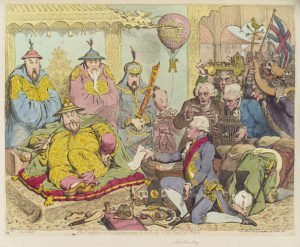1792 Overview

The most important naval event of 1792 was the departure of the Macartney Embassy to China. It was not a qualified success, as this caricature shows.
In 1792 war clouds gathered over Britain as revolutionary France took up arms against her continental neighbours. The Prime Minister, William Pitt, was initially averse to hostilities and was more intent on making economies in the armed forces, and so when France declared war on Austria on 20 April he declared a policy of non-intervention. However, with France s defeat of Prussia in September he was almost alone in desiring the continuation of this policy. Two months later France won the Battle of Jemmapes and forced the Austrian withdrawal from the Belgian Netherlands, and with the Dutch now under threat even Pitt s thoughts began turning to war. Parliament agreed to raise the naval strength to a quarter of that employed in the American Revolutionary War, and thirty-three new sail of the line which had since been built and laid up were made ready to support the dozen in commission.
As Britain sought to extend her commercial ties across the world an embassy led by Lord Macartney sailed for China in September aboard the Lion 64, Captain Sir Erasmus Gower, being accompanied by two other vessels. The mission returned home two years later having proved largely unsuccessful in its objectives as a consequence of Chinese circumspection and suspicion. Even less successful was an attempt by Lieutenant Philip Beaver and various philanthropic and business associates to establish a colony off Sierra Leone, for after sailing in April it faced a multitude of problems and was eventually abandoned at the end of 1793.
In the West Indies the mixed-race Lieutenant John Perkins found himself imprisoned and facing the death penalty for allegedly assisting the ex-slaves on Saint-Domingue in their civil war with the French colonists, but a display of aggression by the no-nonsense Commander William Nowell on 24 February ensured his release. Another intimidating and impressive officer, Rear-Admiral Adam Duncan, who had married into the influential Dundas family, used his force in attempting to quell an Edinburgh riot on 5 June, but although he was obliged to back down with several wounds it was not before he had battered many of the mob attacking his mother-in-law s residence. A further member of the extended Dundas family, Captain George Dundas, sacrificed his own life to save others when the East Indiaman Winterton was wrecked off Madagascar on 22 August although the survivors including a young naval officer, George Ralph Collier, would face further disasters before they eventually reached sanctuary.
